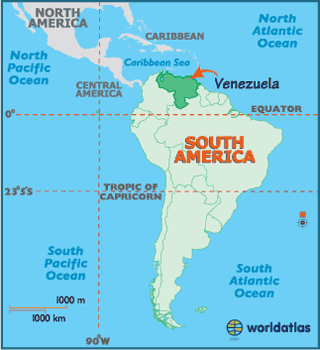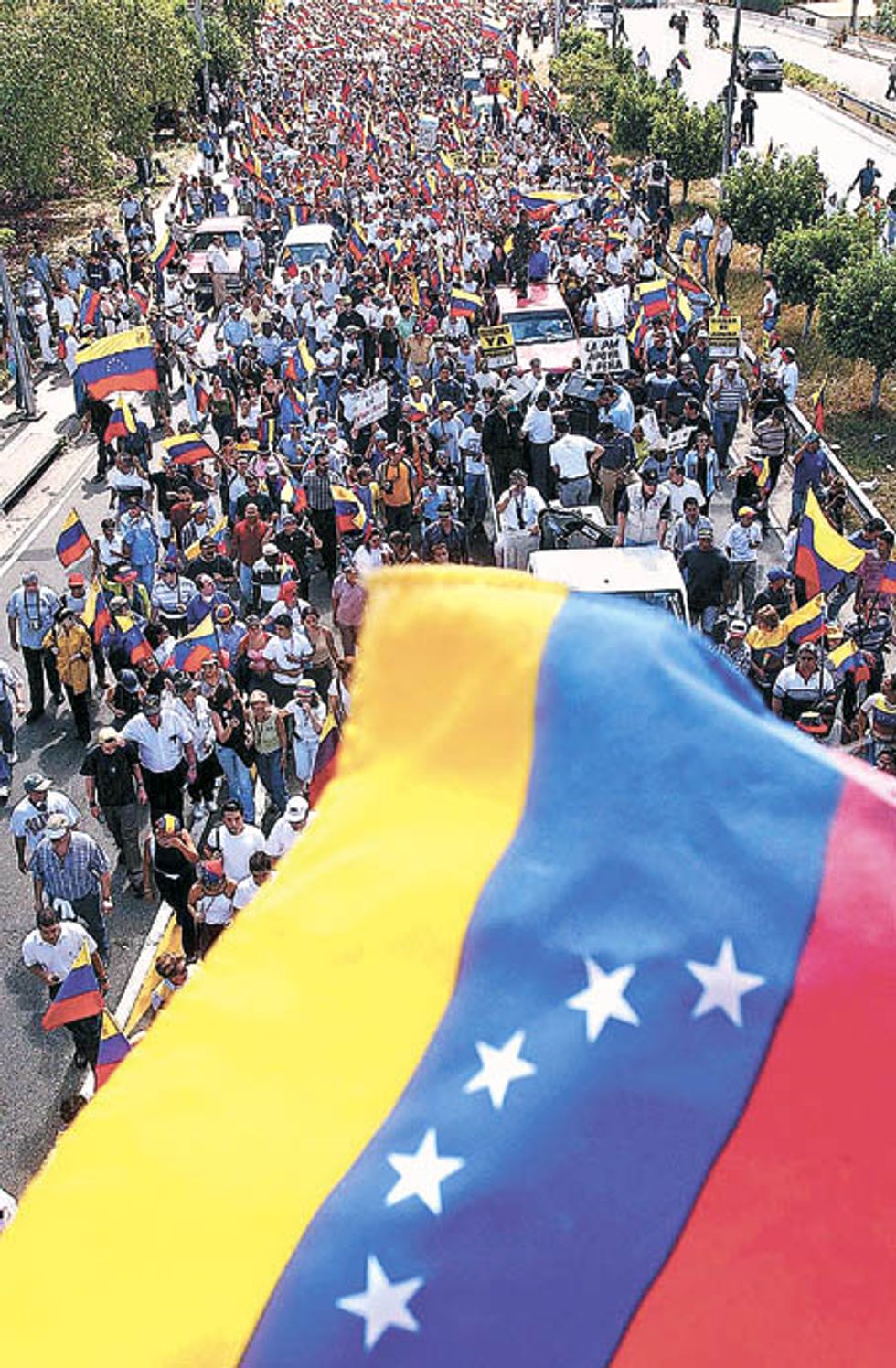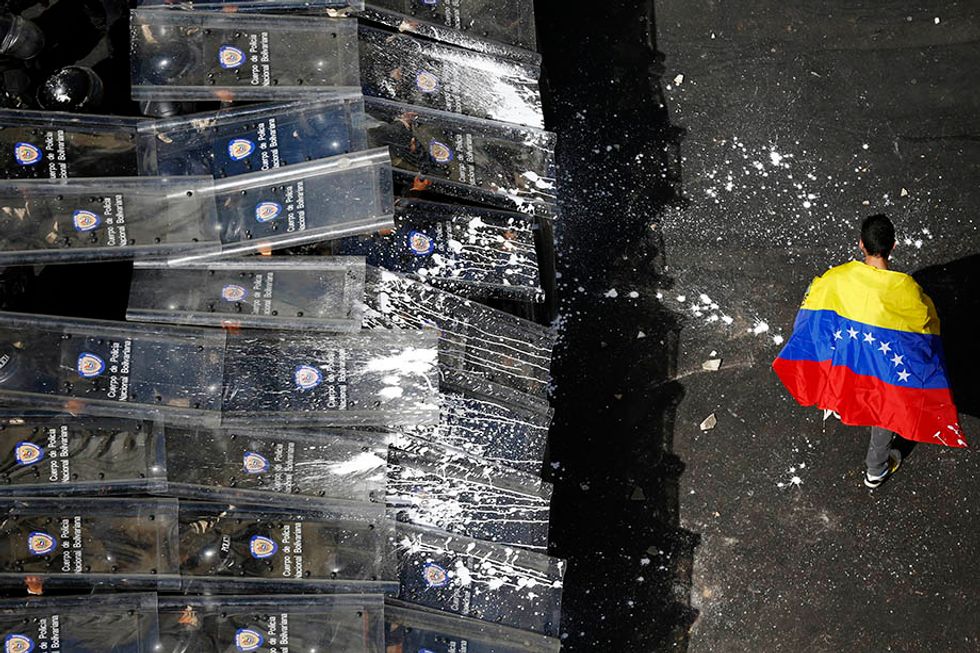As you may know, many have been talking about what is happening in Peru or in Syria, but there is not a lot of coverage global coverage about what is happening in Venezuela. Some of you may ask: Where is Venezuela? What is Venezuela? Why do you talk so much about Venezuela? Well, to answer those questions: Venezuela is a country that is located in the north of South America, it is Colombia's neighbor. I like to talk about Venezuela because is the country that watched me grow and made me who I am, and right now Venezuela is going through hard times. My idea is to spread the word about the Venezuelan's hardships. For this, I have to tell the story from the "beginning":
In 1998, the former President of Venezuela, Hugo Chávez, won the election. He took power in 1999. He won the elections using a populist and socialist message, he wanted to give power to "El pueblo" or the people of Venezuela. The problem is that he considered the people, those who did not have that many resources so he wanted to give more power to the lower classes of society. He was a skilled speaker and people loved him for that, his followers considered him their father, but they did not realize that he was getting richer while others were getting poorer. It didn't matter that this was happening because people loved him, we had food, we were a rich country, and we could have a peaceful life.
Chávez's government made the Bolivar (national currency) lose value, the black market dollar could go up until a thousand Bolivares, the government never acknowledged this and in 2002, they installed a system to control the change of currency with the excuse of protecting the people's money. In reality, most of the money was being stolen, the petroleum prices were decaying, and we needed more imports to keep producing in our factories. Then, he started to expropriate private companies and making them part of the government's industry. Each private company which was expropriated lowered the quantity of produced products. Resentment and hate started to grow within the population and a division was visible in the capital city of Caracas, the ones from the West and from the East. These separations represented the political affiliation and economic situation. Those who supported the government resented everyone who wasn't with them because the government called the opposition "squalid" and "fascists".
When Chávez got sick, he hid it from the public until it was impossible to hide. He was being treated in Cuba, away from the public, and where they could hide what was happening. The news about his death was released to the public on March 5, 2013. He could have died before and no one would have known. Before his death, he appointed Nicolás Maduro, who is the actual President, as his successor. Chávez died before the presidential term was over so Maduro finished the presidential term, and started preparing for the 2013 elections. Maduro presented himself to the Venezuelan people as Chávez's son, the one chosen by the former president to govern in his name. He used this tactic to win the elections and keep the Chavistas, people who supported Chávez, in office.
The problems exploded when Maduro won the 2013 elections against Capriles, the opposition's leader at the time. The result's difference was so narrow that there could have been a mix with the results, and most of the people didn't trust and don't trust our electoral system because there have been problems with people having different IDs with different names so they could vote repeatedly.
After Maduro won, he kept doing was Chávez was doing, but he was desperate for power so he received advice from Cuba's government. In other words, we were going to become a dictatorship, but he was too afraid to say at first. He knew he wasn't Chávez, that is why Maduro needed to keep his memory alive. Throughout all these years, the insecurity has grown, there are kidnaps, robberies, and killings. Our death rate is higher than a country that is at war, and it's all because of the insecurity. Most of the people who resort to these are out of necessity, but others are part of the police officers. Many people from the government have bank accounts outside the country with all the money that they have gotten from Venezuela, and others are involved in drug trafficking. it is a vicious circle, there is no way out because we do not have the resources. All of the governmental institutions are controlled by Maduro and his followers.
In 2014, a wave of protests shook the country. Starting in February the students started protesting for their rights, opposing the government, and protesting about the economic crises. Everything started when a former Miss Venezuela was killed while she was visiting Venezuela. Many people got out on the streets to support the students. The whole country was united against Maduro's government, but the officials were repressing the people who were protesting causing 40 deaths and hundreds of wounded. The opposition leader, Leopoldo López, was taken into custody and is serving 13 years in jail. The protests kept going for the rest of the year, but nothing changed. The situation kept deteriorating.
Now, 2017, if you go to Venezuela you are not going to find food in the supermarkets or medicines in the pharmacies. People have to spend hours in a line to receive a certain quantity of basic products that you cannot find because the prices have been regulated, meaning that it costs more to produce and distribute them than the price they are selling at. Depending on your ID number you have a designated day when you can go buy those regulated products and if on your day there aren't any of the products you have to wait until they come again. Also, with the minimum wage you cannot buy food weekly for a whole family, there is a chance you can't even afford to buy food for one person. The food prices are rising almost every day because of the inflation, but the wages remain the same. There are people starving because they cannot buy food for their children or themselves. The Venezuelan diet consists of pasta (if you can find), rice (if you can find), potatoes, and maybe flour. Many times, people would only eat once a day, it is difficult to find milk formula for babies and diapers, and the meat and vegetables are almost impossible to afford. Before, you would have never seen people looking for food in the garbage bags people throw on the streets, or people bringing bags to grab the mangos that fall from the trees.
The opposition had won the National Assembly elections in December 2016, but in March and April 2017, the problems started again, not only because there is no food or medicines, but because the government instated a self-coup. Maduro wanted the government to be centralized and controlled by the Chavistas. This means that all people who were part of the National Assembly, were no longer part of the government. This is against the Venezuelan constitution and people started protesting against it. The idea of the protests was to get to the Center of Caracas where the National Assembly is, but the police and national guard made a barricade to keep the protesters away from the center. Also, the news channels are not broadcasting what is happening in the protests so our only way to keep us informed is using social media. Most of the news channels are controlled by the government or are too afraid to broadcast what is happening because they don't want the government to get them out of the air, like they have done with other channels before. Also, Maduro said that he was not going to convoke any elections in 2018 and that he was going to stay in power. In other words, they finally accepted that they are a dictatorship and that they don't want to leave the power.
I wanted to talk about this because not a lot of people know what is happening, and if you know what is happening that means you have a Venezuelan friend who told you about it. It is really sad that such a beautiful country has to go through such hard times so I am asking whoever is reading this to share it and create consciousness because even if you have no connection to what is happening your contribution helps
I still support and pray for my beautiful country because I still hope that someday I will be able to return. My beautiful Venezuela be strong because you are not alone:
"Even if I am far away from you I can promise you I will never forget what you gave me. No one can erase how happy, sad, and grateful I am for having met you and your magnificent persona. No one will ever understand how difficult it was for me to leave you. It is difficult to understand if they haven’t met you, but you are someone that changed the way I see the world. You basically raised me, and you taught me so much. Even if right now you are not the same I will always remember all the good things about you. It does not matter what others think they know about you because they will never understand the struggles you’ve been through. I just wanted to remind you that you are not alone, and that there are many who will happily help you when you need it. Always remember that I love you."
#SOSVenezuela #VenezuelaAgainstTheDictatorship






















